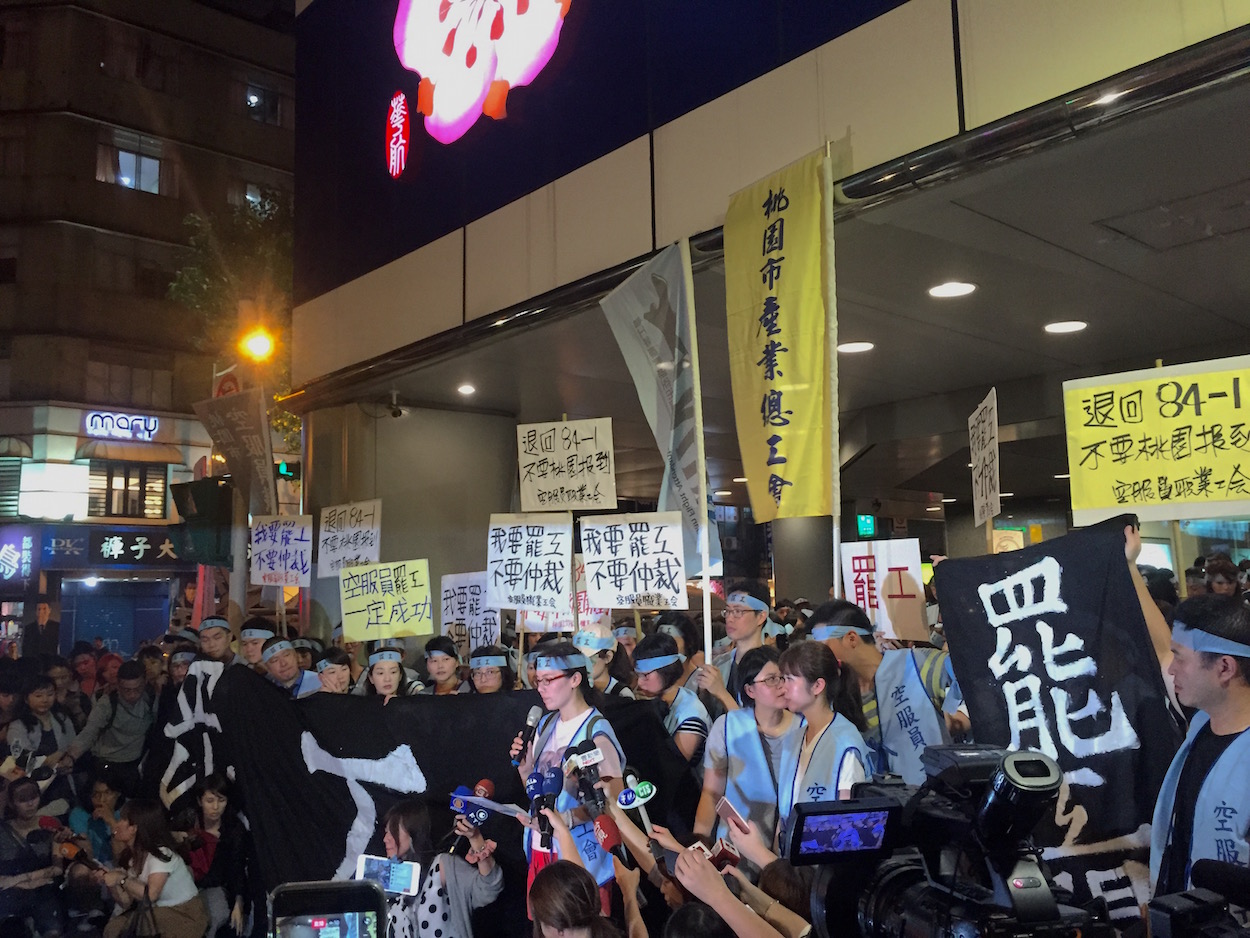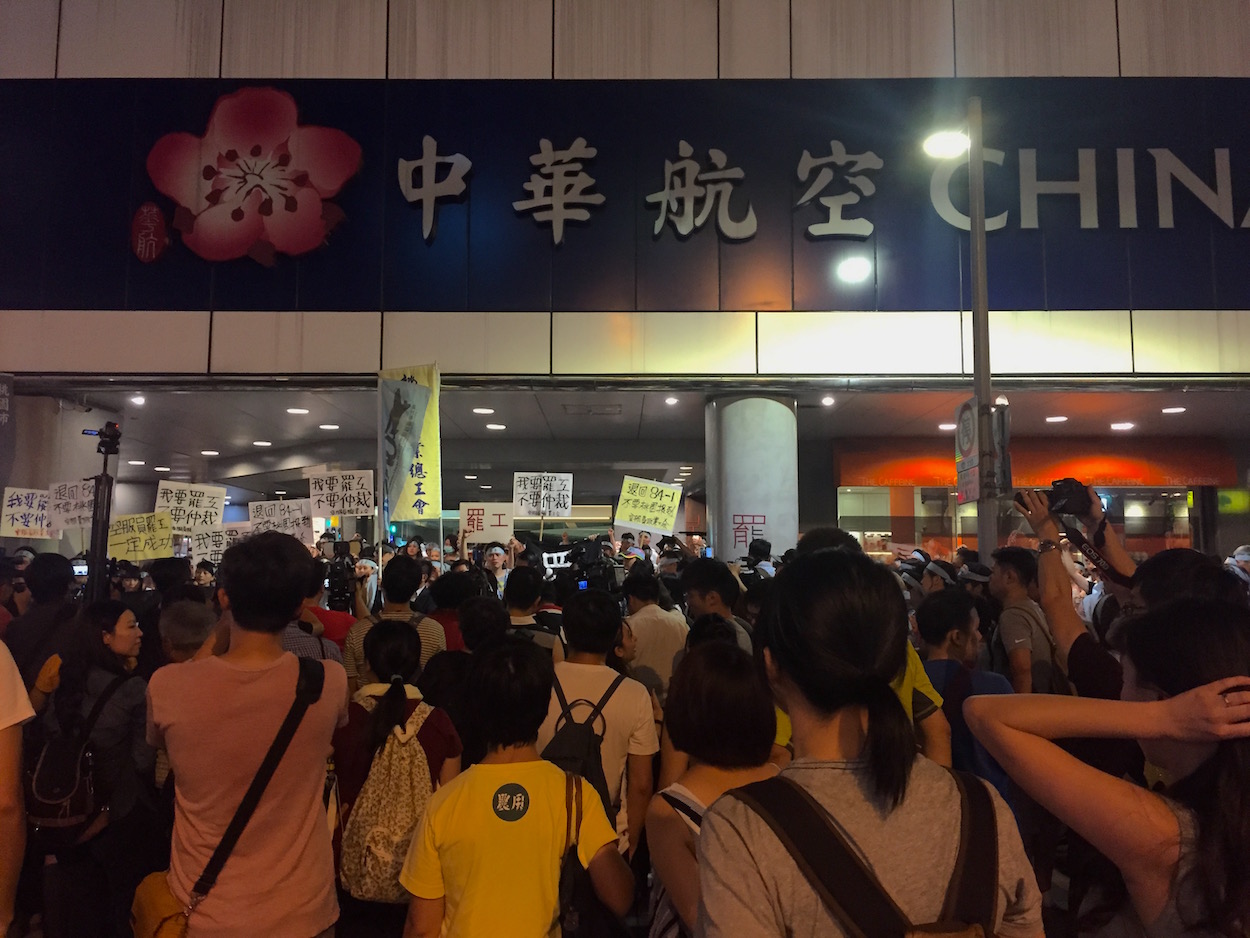by Brian Hioe
語言:
English
Photo Credit: Brian Hioe
ANGER HAS BROKEN out from activists after punishment against China Airlines workers for participation in the China Airlines strike last year, the first strike in the history Taiwan’s airline industry. This took the form of the firing of China Airlines workers Lin Xinyi, forced transfer of Zhang Shuyuan, and Zhu Liangjun facing punishment and being made to sit down talk with management.
In particular, what Taiwanese youth activists are angry about is that China Airlines has been allowed to the trample over the rights of union members to organize and demonstrate, as well as to punish them for exercising their freedom of speech. China Airlines has directly singled out Zhang, Zhu, and Lin’s because they were spokespersons for striking workers during the strike last year and shared press releases from the strike. Zhang was also a participant in a skit mocking company management, during the course of which Zhang shaved his head.
 The China Airlines strike last year. Photo credit: Brian Hioe
The China Airlines strike last year. Photo credit: Brian Hioe
China Airlines has stated that their actions last year would be a violation of the company’s internal regulations, as a result of which it has deemed it appropriate for Zhang and Zhu to be punished and for Lin to be punished. Despite China Airlines vowing to sit down and discuss issues with workers at the end of the strike, clearly China Airlines has now taken action to punish those that participated in the strike, even when workers have the right to strike and the right to freely express their political views.
These disciplinary actions comes on the heels of a wave of firings of workers involved in labor organizing by Far Eastern Airlines. After the historic China Airlines strike proved electrifying to Taiwanese youth activists, the airlines industry saw an uptick of labor organizing, with unions formed in Far Eastern Airlines and EVA despite the fact that this was previously thought to be unlikely, because of management making it clear beforehand that they would not tolerate union activity. Seeing as the China Airlines strike garnered a great deal of public attention at the time, it may be seen as the flagship of contemporary labor struggles in the Taiwanese airline industry, and it could be that airline company managements wish to draw a firm line in the sand against future organizing.
Likewise, the China Airlines strike was fronted by the Taoyuan Flight Attendant’s Union instead of the China Airlines Employees’ Union, given that the China Airlines Employees’ Union was a management-friendly labor union that, as a result, actually took a stance of opposition to the China Airlines strike. But increased momentum in organizing after the strike actually allowed for the China Airlines Employees’ Union to be changed from a friendly to management to one supportive of labor rights, through a change in the union leadership. Much labor organizing continues in the Taoyuan Flight Attendant’s Union, however, which continues to serve as a means of organizing for China Airlines workers as well as other airlines, including EVA and Far Eastern Airlines.
 Photo credit: Brian Hioe
Photo credit: Brian Hioe
In consideration of the fact that China Airlines is largely seen as a state-owned enterprise, given the large amount of government investment in it, China Airlines workers have taken to criticizing inaction from the Executive Yuan, which vowed to step in and settle things equitably last year after the China Airlines strike, seeing as the government is the majority owner of China Airlines. Nevertheless, since William Lai took over a premier, the Executive Yuan has sided with business interests in attempting to force through changes to labor policy seen by many as undoing decades of labor reforms in Taiwan. As such, China Airlines workers, who have also been active in demonstrations against these labor reforms, have also taken the stance that action from the Executive Yuan is unlikely to intervene on their behalf and that tolerance of such actions by China Airlines’ management is part of the broader pattern of disregard of workers by the government.
And, indeed, some, including activist lawyer Handy Chiu of the NPP, have suggested that China Airlines’ actions touch on sensitive issues regarding democratic rights in Taiwan, particularly in light of the fact that Taiwan is currently commemorating thirty years since the end of martial law and because December 10th recently served as a World Human Rights Day. For example, can democracy truly be said to exist in Taiwan if simply sharing a press release on Facebook is grounds for termination of one’s employment, particularly when this occurs in a state-owned enterprise? Such questions remain to be answered.

